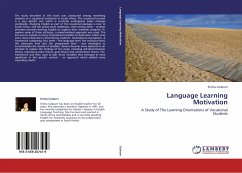Errors naturally appear in spontaneous speeches and conversations. Particularly in a second or foreign language, it is only natural that mistakes happen as a part of the learning process. After an inappropriate expression is detected, it can be corrected. This act of correcting can be initiated either by the speaker (non-native speaker) or the recipient. The former phenomenon is referred to in second language acquisition (SLA) research as self-initiated self-completed repair. This study examined whether the occurrence and the success rate of self-initiated self-repair by 32 Japanese senior high school learners are influenced by grammatical difficulty of triggers (initial errors or mistakes). The results showed the high success rate of self-initiated self-repair regardless of grammatical difficulty of triggers, which implies the importance of creating situations where students can self-initiate to repair their own errors and mistakes.
Bitte wählen Sie Ihr Anliegen aus.
Rechnungen
Retourenschein anfordern
Bestellstatus
Storno








